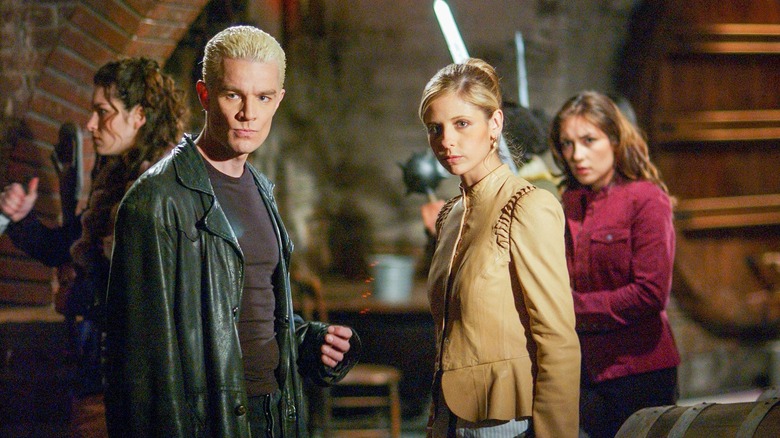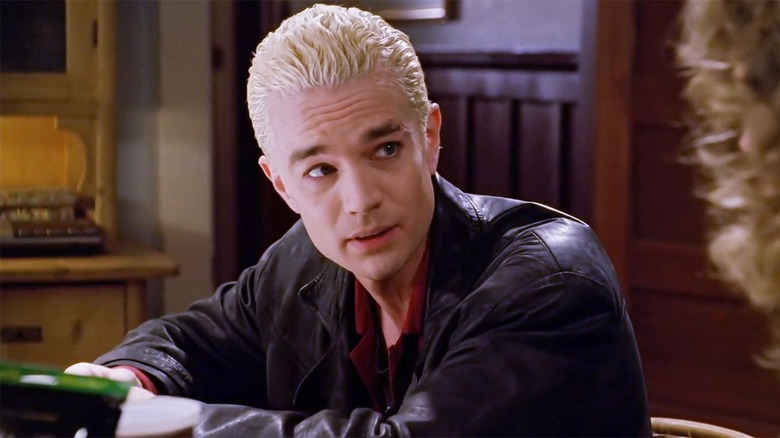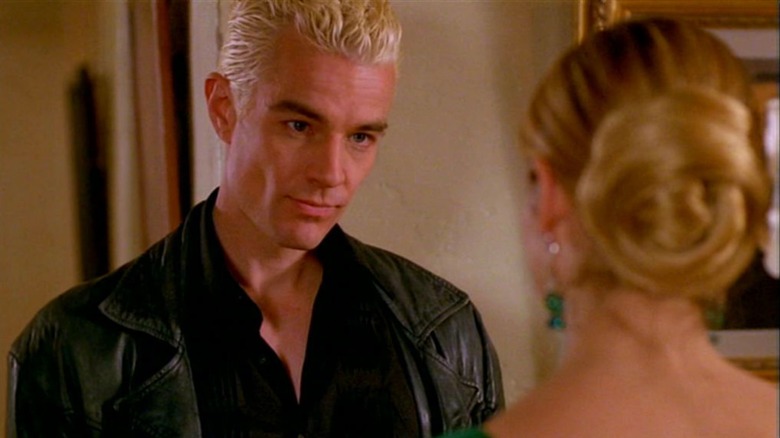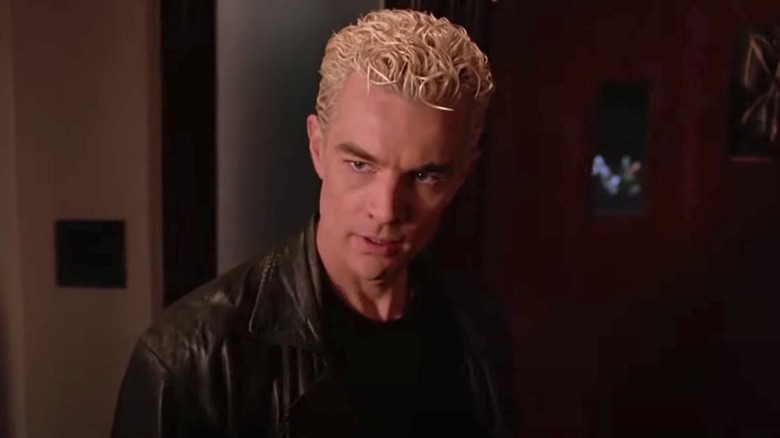The Secret Weapon Behind Spike's Success On Buffy The Vampire Slayer
From the minute he came crashing into Sunnydale, it was clear that Spike was a force to be reckoned with. A countless number of demons appear in the seven seasons of "Buffy the Vampire Slayer," but only a few make a lasting impression. Spike does more than that — he steals the whole show. A lot of the British bad boy's charm can be credited to his whip-smart dialogue, his poetic backstory, and a five-star performance from a shockingly American James Marsters. But one unsung hero gave Spike a first impression so good that he became an instant fan favorite — and he risked his career to do it.
In its first season, "Buffy" established a consistent formula. A new demon pops up every week, but one formidable foe — the Master — acts as the final boss, a looming threat for the whole season that is finally defeated in the finale. Season 2 breaks this pattern immediately when Spike rolls into town. Rather than being defeated in a single episode, Spike crashes parent-teacher conference night in "School Hard" and promises to be a thorn in Buffy's side. He seems like he might be the Big Bad of the season — but the show subverts expectations.
"He was set up to be a disposable villain," Marsters said of his character in an interview with A.V. Club. "He was set up to be the ultimate Big Bad, the ultimate cool guy, just so that when Angel killed him, he could be the Big Bad and break Buffy's heart, basically. That was the whole point. When Angel goes bad, he goes bad in a big way. Then they decided to include me into the series."
So what exactly made Spike so special that they decided to change the entire format of the series to fit him into it?
The director of Spike's first episode risked 'career suicide'
When Marsters joined the cast of "Buffy the Vampire Slayer," he was only signed on for five episodes as "Druisilla's boy toy," the actor revealed to ComicBook.com. But Spike was an instant hit — from his very first appearance, the fans loved him so much that the series creators decided to keep him past his intended expiration date. Marsters gives an endearing performance, but the hidden force behind Spike's longevity was the director of his very first episode, John T. Kretchmer.
Kretchmer had only directed one episode of "Buffy" before "School Hard," and he never directed another — a job he willingly gave up in favor of creating one of the most memorable character introductions of all time. The episode remains one of Marsters' favorites of the series, he told A.V. Club:
"I have very fond memories of the first one I was in. That was just such an intense experience. I think the director committed career suicide. He got so excited by what was happening in the episode, and birthing this character with me, that he started adding shots. And he was blowing budget, and [producer] Gareth Davies came down and told him, 'If you don't rein it in, you are never coming back on this show.' And he came to me and he said, 'Look, they just told me I'm never going to be on this show if I don't rein it in. I'm not reining it in. I don't care. This episode is going to be amazing. And I'm going to get so much work off it in other places. But I'm going to make this really cool.' And he really did. I think part of the reason the character broke out quickly is because that first episode was so tight, as far as how many shots he got."
Marsters 'pulled out all the stops' to stay on the show
Kretchmer may have given up his chance at directing another episode of "Buffy," but he was right about the potential for "School Hard" to score him more work. His post-"Buffy" CV includes other iconic teen shows of the early aughts like "Charmed" and "One Tree Hill" as well as contemporary teen soaps like "Riverdale." Decades after sticking his neck out for the sake of an unforgettable episode, he is still directing TV today.
But of course, Kretchmer was not the only reason that Spike stuck around for so long. Marsters fought to keep his character on the show for as long as possible, despite series creator Joss Whedon's insistence that he would not overstay his welcome.
"I was pulling out all the stops in order to not get killed off," the actor confessed to Observer. "Joss said, 'You are a soulless vampire. Vampires on this show are a metaphor for all the trials of being a teenager. I'm not interested in vampires that we feel for.'"
Spike was written as a soulless demon and "jerk boyfriend," but Marsters knew he would have to work a different angle if he wanted to win the audience over. Instead, he played up his character's love for the helpless Druisilla, giving him an unanticipated depth. The actor put a twist on one line in particular that came to define his character's romantic sensibility — when Drusilla is naming all the stars, he softly corrects her. "You can't see the stars, love," he says. "That's the ceiling. Also it's day."
"I decided to rest my chin on my hand like, 'You are so weird and that's what I love about you,'" he added. "'My favorite thing about is you is that you are seeing the stars, but it's the ceiling. I just fell in love with you again.'"
Spike's grand entrance made his appeal undeniable
Even after an overwhelmingly positive reception from fans, Whedon was still very resistant to keeping Spike alive. Angel had already broken the core analogy of the series — that vampires were metaphors for teenage challenges, intended to be overcome. Without a soul to reform his demonic impulses, Spike completely threw a wrench into Whedon's metaphors.
"I remember when after a couple episodes, the fan reaction was that I was a romantic character," Marsters recounted to ComicBook.com. "Joss backed against the wall and said, 'I don't care how popular you are, kid. You are dead. You are dead, you hear me?'"
The writers never really knew what to do with Spike, but even Whedon couldn't deny how much spunk and complexity that Spike brought to the show. He is an absolute joy to watch from the moment he bursts onscreen. The momentum behind this Hellmouth-shattering character is established in his very first episode, and for that, we have Kretchmer to thank.
It might have been the last episode of "Buffy" he directed, but it changed the shape of the series from that point on. Kretchmer answered a key question that every artist has when working with a big-budget studio — is it better to follow the rules and keep your head down in hopes of getting hired again, or to break boundaries and take risks in hopes of establishing a greater legacy? By choosing the latter, the director had a lasting impact on the series, and Spike got the grand entrance he deserved.



